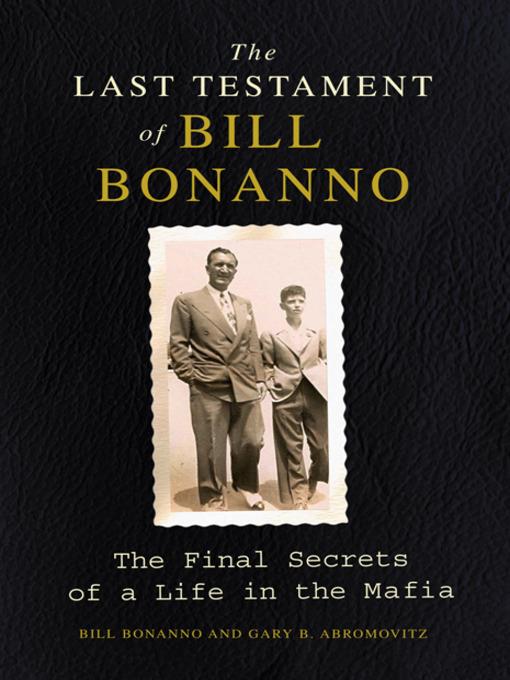
The Last Testament of Bill Bonanno
The Final Secrets of a Life in the Mafia
کتاب های مرتبط
- اطلاعات
- نقد و بررسی
- دیدگاه کاربران
نقد و بررسی

June 13, 2011
In this intriguing if scattered follow-up to Bound by Honor, former mafioso Bonanno (1932â2008) sheds more light on the inner workings of New York's Five Families, but the power of his tales is diminished by a lack of narrative structure. He takes readers behind the closed doors of the famous Commission and highly secretive meetings, where the families met to settle disputes, stories which Bonanno left specific instructions about: they were to be shared only after his death. Bonanno is careful to stress his account's veracityâhis father, Joseph Bonanno Sr., was a Commission memberâand the inaccuracy of everything from FBI reports to The Godfather. While Bonanno gives a condensed history of the Mafia, the real gems are the Commission's meetings, started in 1931 in the wake of the Castellammarese War, when the original five New York familiesâGagliano, Mangano, Bonanno, Luciano, and Profaciâgathered to broker peace among themselves. Never before has firsthand knowledge of these gatherings been shared. But for all his exclusive access, Bonanno (and Abromovitz, a retired lawyer who worked with FBI profilers and interviewed Bonanno for 12 years) offers up only a stitched-together collection of anecdotes, names, and dates. Photos.

June 15, 2011
The real story of Mafia life, from one who lived it.
Bonanno (Bound by Honor: A Mafioso's Story, 1999, etc.), the son of eminent Mafioso Joseph Bonanno and himself a long-serving consigliere to the family, sets the record straight about "this thing of ours," calling out Hollywood's inaccuracies about mob life and setting down the history of the mob from its inception in the feudal hills of Sicily to the organized gangsters that have long titillated the public imagination. The author asserts that the traditions and attitudes that would inform Mafia life in the United States originated in Sicily after centuries of invasions and disenfranchisement by legitimate governments, the attendant insularity, secretiveness and codes of honor serving as protection for a cheated and abused people. These traditions came along with the Sicilian immigrants who settled in America and served a similar purpose, offering a mechanism for dealing with a confusing and often hostile new society. Bonanno copiously details the original families that dominated organized crime in American cities, detailing the summit meetings of the Mafia's governing body and limning the well-known exploits of such famous gangsters as Lucky Luciano, Bugsy Siegel and Al Capone, but his real brief is to dispel the myths about his way of life promulgated by popular culture. Bonanno's chief complaint is the perception of the Mafia as a rigidly hierarchical body dominated by all-powerful dons handing down orders from on high; in the author's view, participants in "his world" were largely autonomous, bound principally by shared attitudes and traditions. He is downright peevish on the issue, and his reminiscences are dryly actuarial and utterly without humor, making navigation of the many names, places and events a bit of a slog. Attempting to correct Hollywood myth-mongering, Bonanno swings too far in the other direction, rendering the exploits of shadowy, murdering criminals about as exciting as the minutes from an insurance convention.
A serious, informative look at the Mafia from the inside, but fatally lacking in zest.
(COPYRIGHT (2011) KIRKUS REVIEWS/NIELSEN BUSINESS MEDIA, INC. ALL RIGHTS RESERVED.)

August 1, 2011
Bonanno, who died in 2008, is best known for his collaboration with Gay Talese on the nonfiction Mafia chronicle Honor Thy Father (1971). Retired attorney Abromovitz interviewed Bonanno over a 12-year period. Together, they provide a sometimes fascinating, sometimes tedious account of the origins, growth, and structure of what is commonly called the Mafia. Whatever its value, the book is a moral outrage. While insisting they won't justify the acts of the Mafia, the authors proceed to do just that. They consistently remind us that in Bonanno's world, actions, including murder, torture, extortion, and drug pushing, are acceptable, as if he and his colleagues were from a separate species not bound by the mores of the rest of humanity. Still, those unfamiliar with the history of organized crime will find much of interest here, particularly in the account of the origins of the Mafia in Sicily and the descriptions of the various turf wars between Mafia families.(Reprinted with permission of Booklist, copyright 2011, American Library Association.)

























دیدگاه کاربران